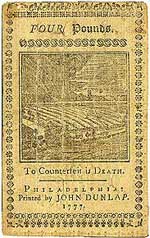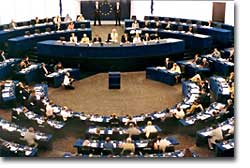
3. Federalism

Before the Constitution was written, each state had its own currency. This four pound note from Philadelphia reads, "To Counterfeit is Death."
Did you ever wonder why you don't need a passport to go from New York to California, but if you were to move from one state to another, you would need a new driver's license? Or why you can use the same currency in all states, but not be subject to the same speed limits? Or why you have to pay both federal and state taxes?
The maze of national and state regulations results from federalism — the decision made by the Founders to split power between state and national governments. As James Madison explained in the "Federalist Papers," our government is "neither wholly national nor wholly federal."
Federalism as a System of Government
In creating a federalist system the founders were reacting to both the British government and the Articles of Confederation. The British government was — and remains — a unitary system, or one in which power is concentrated in a central government. In England, government has traditionally been centralized in London, and even though local governments exist, they generally have only those powers granted them by Parliament. The national government is supreme, and grants or retains powers to and from local governments at its whim.

The Russian Federation, also known simply as Russia, has a federal government with a variety of partially self-governing autonomous regions, or oblasts. Most of these, such as the Jewish Autonomous Oblast, are concentrations of non-Russian ethnic groups.
The Articles of Confederation represented an opposite form of government, a confederation, which has a weak central government and strong state governments. In a confederation, the state or local government is supreme. The national government only wields powers granted by the states. Most confederations have allowed the local government to nullify a federal law within its own borders.
Federalism is a compromise meant to eliminate the disadvantages of both systems. In a federal system, power is shared by the national and state governments. The Constitution designates certain powers to be the domain of a central government, and others are specifically reserved to the state governments.

| Unitary | Confederal | |
| Advantages | Laws may be applied uniformly to all | Laws may be made to suit individual needs of the states |
| Government | Efforts seldom duplicate or contradict themselves | Tyranny can be avoided more easily |
| Decision-making | Fast and efficient | Government is closer to the people |
| Disadvantages | Concentration of power can lead to tyranny If the country is large, a distant central government can lose control Central officials may not always understand the needs of their citizens | State governments are susceptible to quarrels The country has a tendency to split apart Sub-governments may lack resources that a central government has |
Although the federal system seems to strike a perfect balance of power between national and local needs, federations still have internal power struggles. Conflicts between national and state governments are common. In the case of the United States, the argument of state vs. federal power was a major underlying factor that led to the Civil War.
Fewer than thirty modern countries have federal systems today, including Australia, Canada, Germany, Mexico, and the United States. But even though few other countries practice it today, federalism has provided the balance that the United States has needed since 1787.






